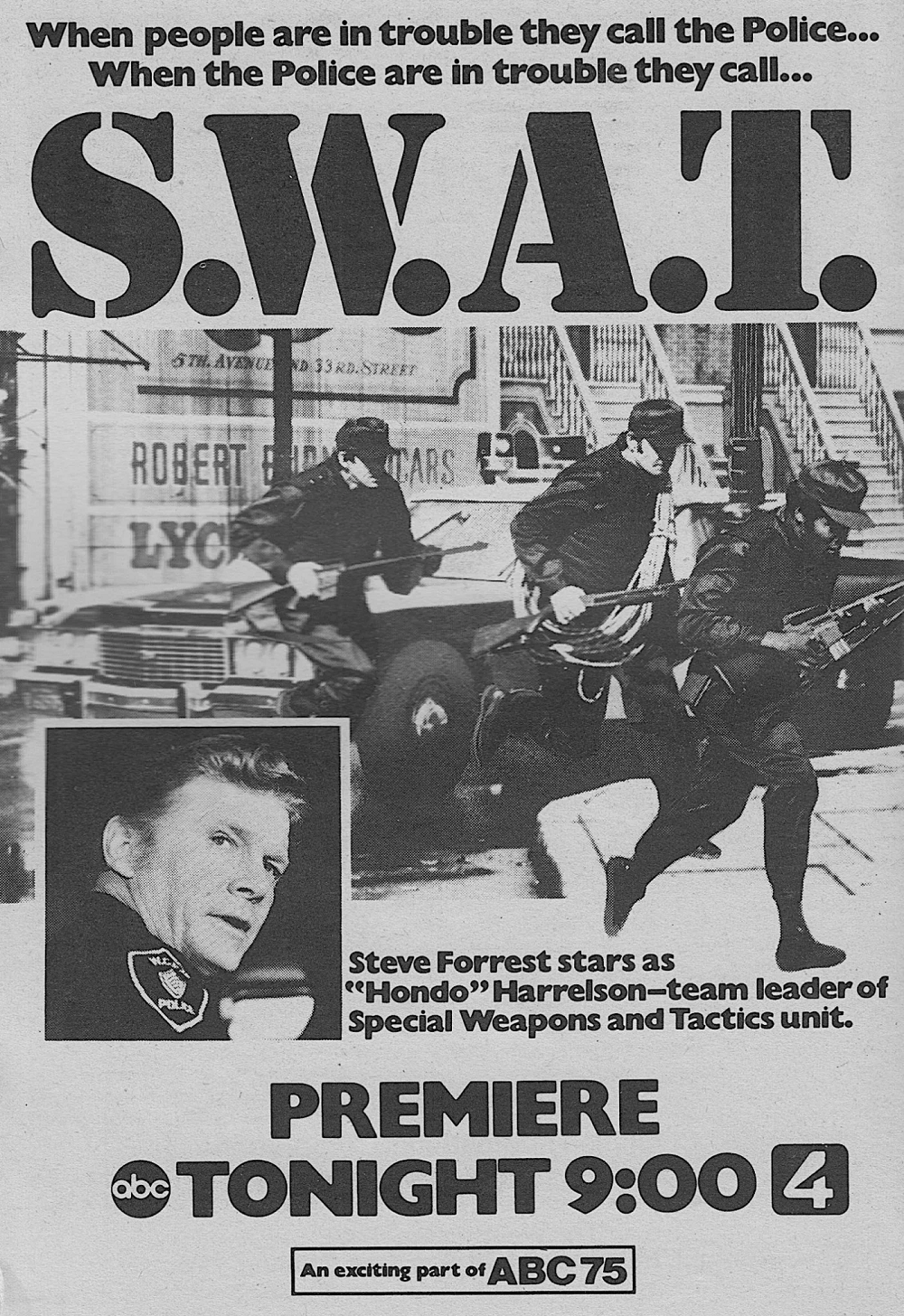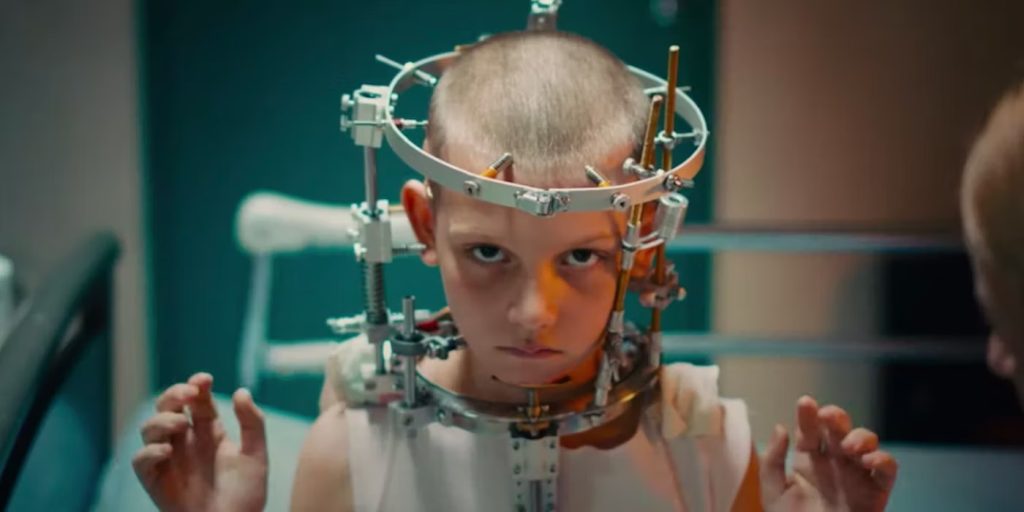Ah, telephemera… those shows whose stay with us was tantalisingly brief, snatched away before their time, and sometimes with good cause. They hit the schedules alongside established shows, hoping for a long run, but it’s not always to be, and for every Street Hawk there’s two Manimals. But here at STARBURST we celebrate their existence and mourn their departure, drilling down into the new season’s entertainment with equal opportunities square eyes… these are The Telephemera Years!
1974-75
The sitcom ruled the roost in 1974, with the top seven shows all falling under that heading, although the situation for the comedies ranged from a bigoted dad and his liberal children to urban Chicago, through a junkyard, an odd couple, and the never-ending Korean War. Those shows not looking for laughs but still finding an audience included The Waltons, Hawaii Five-O, and Kojak, with newcomers The Rockford Files, Little House on the Prairie, and Police Woman all delivering their own charms for NBC, which pretty much shared the viewing figures with CBS, ABC nowhere to be seen.
Kung Fu and the actual Odd Couple both started their final seasons for the alphabet network but they pinned their hopes on a trio of new arrivals in Baretta, Barney Miller, and Kolchak: The Night Stalker, all of which made either a commercial or critical impact for ABC. CBS introduced the world to The Jeffersons and Rhoda, with Petrocelli and Chico and the Man joining NBC’s already star-studded line-up, but what about those shows that failed to make an impact on the readers of the TV Guide? This is the story of four underperforming shows from the 1974 season…
Born Free (NBC): It may seem strange that it took until 1974 for TV to create a spin-off of the 1966 movie (itself based on a 1960 book), but TV often works in waves, the wait attributable to the time it takes to move up the network hierarchy to the point you can greenlight your pet projects. This isn’t necessarily the case for Born Free, but the delay isn’t the strangest thing about the TV sequel…
No, paramount in terms of oddness – but completely understandable for narrative and merchandising purposes – was the decision to ret-con the ending of the movie, negating the message of the whole thing, in order to have the lion be the star. The lion was the star of the movie, too, but it ended with her being fully reintegrated in the wild, a success story for the efforts of George and Joy Adamson, and one based on a true story.
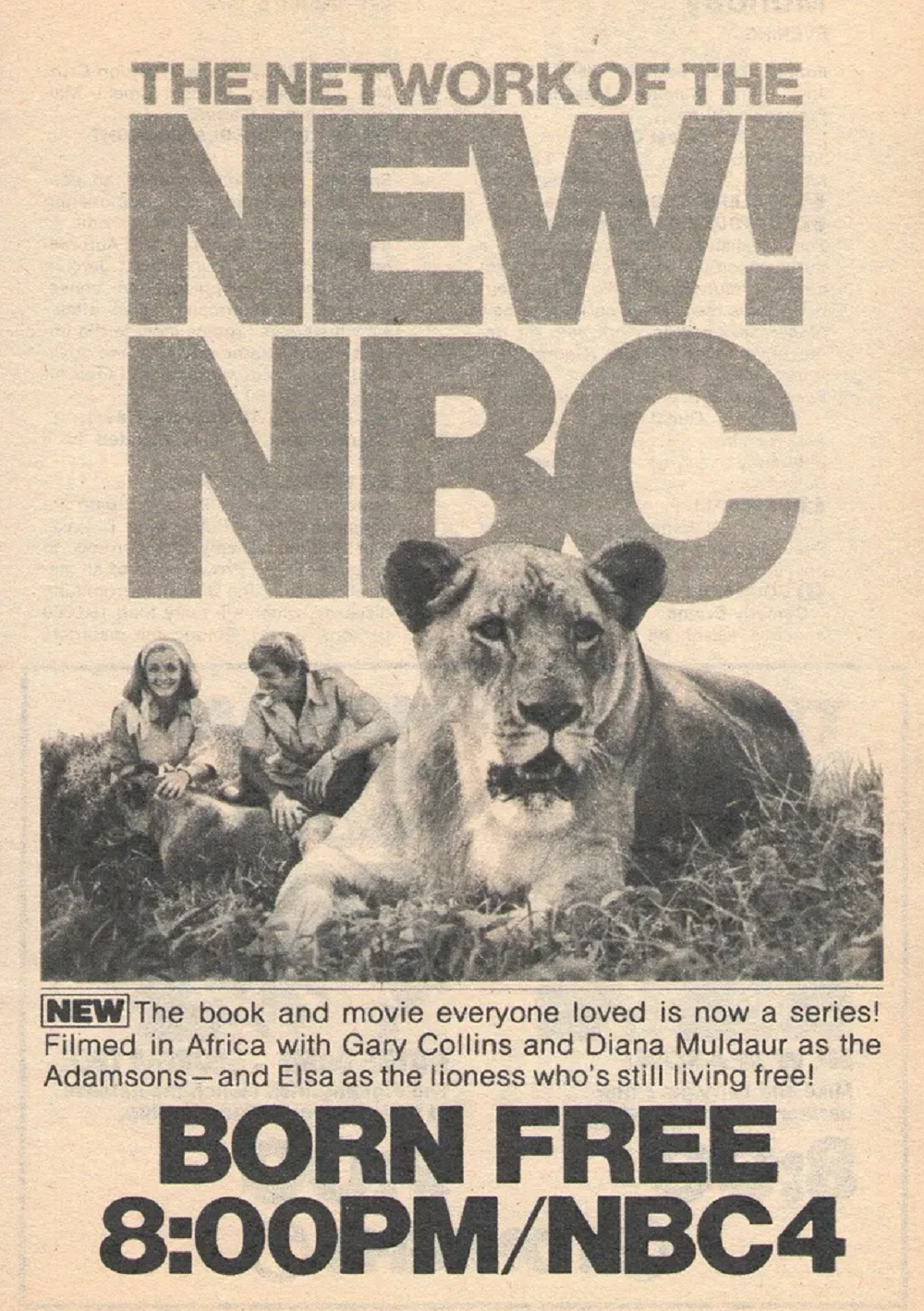
When Born Free – the TV series – premiered on September 9th 1974, the Adamsons (played by Gary Collins and Diana Muldaur) were front and centre but so, too, was Elsa, now a tame lion living as one of the family. Filmed on location in East Africa, the show nevertheless stuck to its conservationist guns, with stories of repentant ivory poachers, sinister big game hunters, and awkward interactions with indigenous peoples, all neatly wrapped up in an hour-long episode.
Scheduled against ABC’s The Rookies (one of only two shows that network had in the top twenty) and Gunsmoke on CBS, Born Free failed to capture any kind of audience on Monday nights and was quietly sent off to a wildlife reserve, where it could play with other failed shows. Twenty-two years later, another attempt was made to bring the Adamsons story to TV but this time it they stripped the Adamsons themselves from the story, in favour of teenage saviours Jonathan Brandis and Ariana Richards. It, too, was taken out and shot.
SWAT (ABC): One of the shows that did for Born Free – ABC’s The Rookies – was so popular that it spawned a spin-off of its own. SWAT – or Special Weapons and Tactics – was set in the police department of an unidentified Californian city, although filming – as with The Rookies – was done in and around Los Angeles.
First appearing in a two-part episode of The Rookies on February 17th 1975, the SWAT team began their own adventures a week later, occupying the slot previously held by The ABC Monday Night Movie and making a formidable two-hour block of extreme police action. With a tagline of, “When people are in trouble they call the Police… When the Police are in trouble they call… SWAT,” the team dived into cases involving stoolpigeons, a thinly-veiled Manson family, anti-basketball terrorists, and all manner of very exciting things!
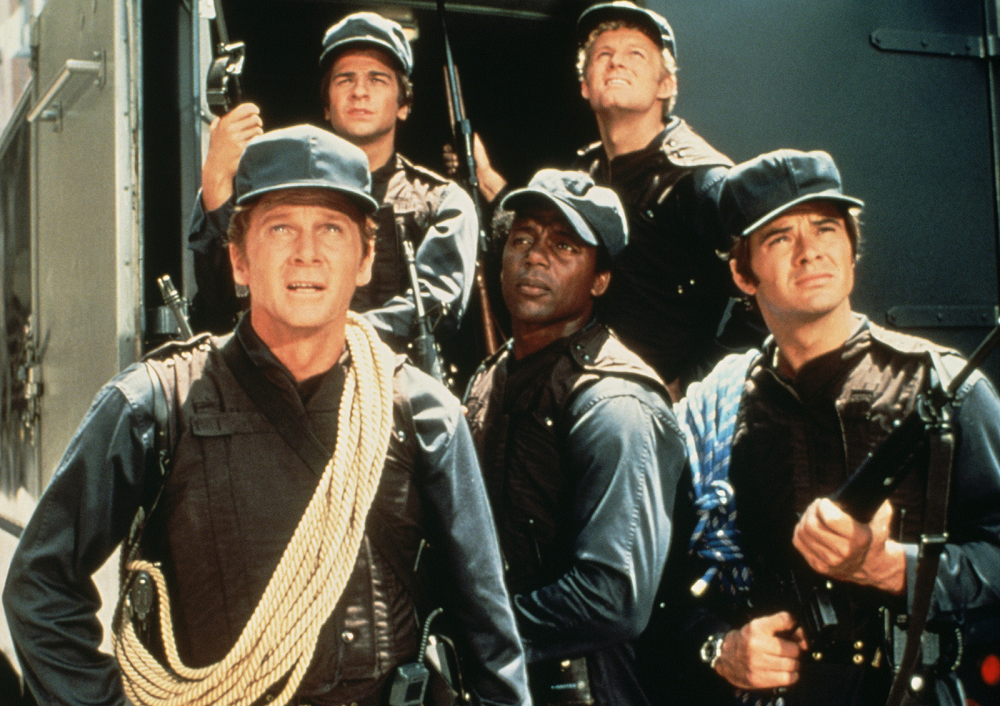
Led by Lt Dan “Hondo” Harrelson (veteran Steve Forrest), the squad also included Rod Perry, Mark Shera, and Robert Ulrich as the new kid on the block, recruited after the death of his partner at the hands of ambush killers and the audience’s way into the story. The show was an instant success, actually earning (slightly) more viewers than its parent show, and a second season was put on the schedule for September 1975.
In the face of criticism from the real-life LAPD SWAT team, both The Rookies and SWAT took a dive in the ratings, falling from eighteenth and fifteenth in 1974-75 to forty-first and seventy–first a year later, and the decision was made to cancel both series. The Rookies enjoyed a second life in syndication but the double episode that acted as SWAT’s backdoor pilot wasn’t included, and it didn’t show up when the complete series was released on DVD. Neither were they included when SWAT got the DVD treatment and are now considered lost.
Khan! (CBS): In something that now seems like a stunt to promote that Khan! was a very different kind of police drama, its star refused an on-screen credit for his role, Khigh Dhiegh told the Chicago Tribune that, “we must remember it is not me, the individual, that is important. That is why I have told CBS I want no credits for the series. The goal is not to make any one person a star, but to create something that is good for all.”
It might have also had something to do with the fact that Dhiegh – born Kenneth Dickerson – was another in a long line of non-Asian actors to portray Asian detectives, going all the way back to Warner Oland in 1931’s Charlie Chan Carries On. Dhiegh regularly played Chinese and other Asian characters, including Wo Fat on Hawaii Five-O, and this drew criticism from Chinese American groups who were no doubt also upset that Khan’s son was played by a Korean American, although his daughter, at least, was played by Taiwanese transplant Irene Yah-Ling Sun.
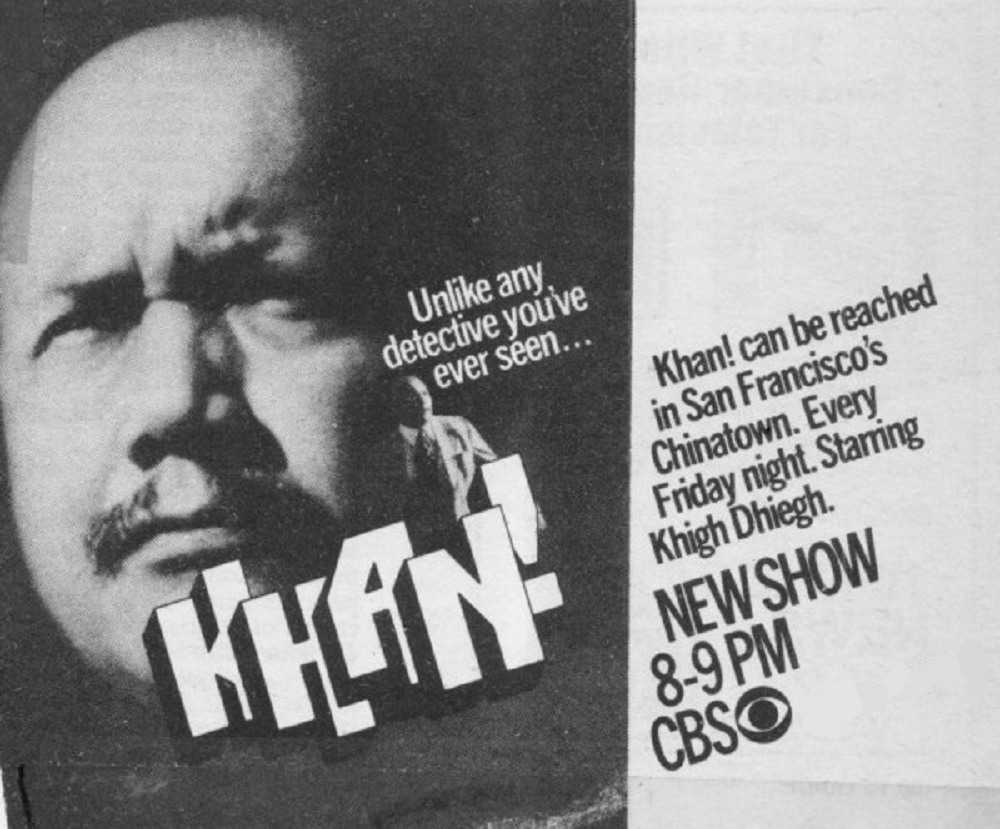
All this took away from the fact that Dhiegh was awful in his own right, his flat delivery betraying the exclamation point in the title, and that the cases seemed to solved without much input from the actual detective. Things had already gotten off to a bad start when pre-screenings of the first episode were so unfavourable that it was junked in favour of episode two going first, and after just one more episode had aired, CBS announced that the third would be the last, replacing it in the schedule with two sitcoms from its inventory.
The seven completed episodes – including that first outing – did get an airing in Australia (where racial sensibilities were and still are much different) a year later. Dhiegh’s career continued on – with credited roles as Attila the Hun, Wong, Colonel Chan, and Four Finger Wu – and completed his final TV movie in 1990. The steamy Forbidden Nights starred Melissa Gilbert as an American teacher falling for her Chinese student, but Dhiegh was there, chewing the scenery as Lu Ming in a cast of otherwise Asian American actors.
Archer (NBC): Although he was initially little more than a Philip Marlowe copy, Ross MacDonald’s Lew Archer developed into a character capable to carrying his own series of novels, with eighteen books released between his debut in 1949’s The Moving Target and 1976’s The Blue Hammer. In 1966, MacDonald’s detective appeared on film for the first time in Harper, with Paul Newman playing the renamed sleuth in an adaptation of that first novel by William Goldman.
Nine years later, Newman was back for more Harper action in The Drowning Pool, although original director Walter Hill jumped before Newman’s arrival citing studio interference in the more action-oriented direction he wanted to take the film. By this point, though, another adaptation of MacDonald’s work – this time using his detective’s intended name – had already been and gone, leaving nary a trace behind.
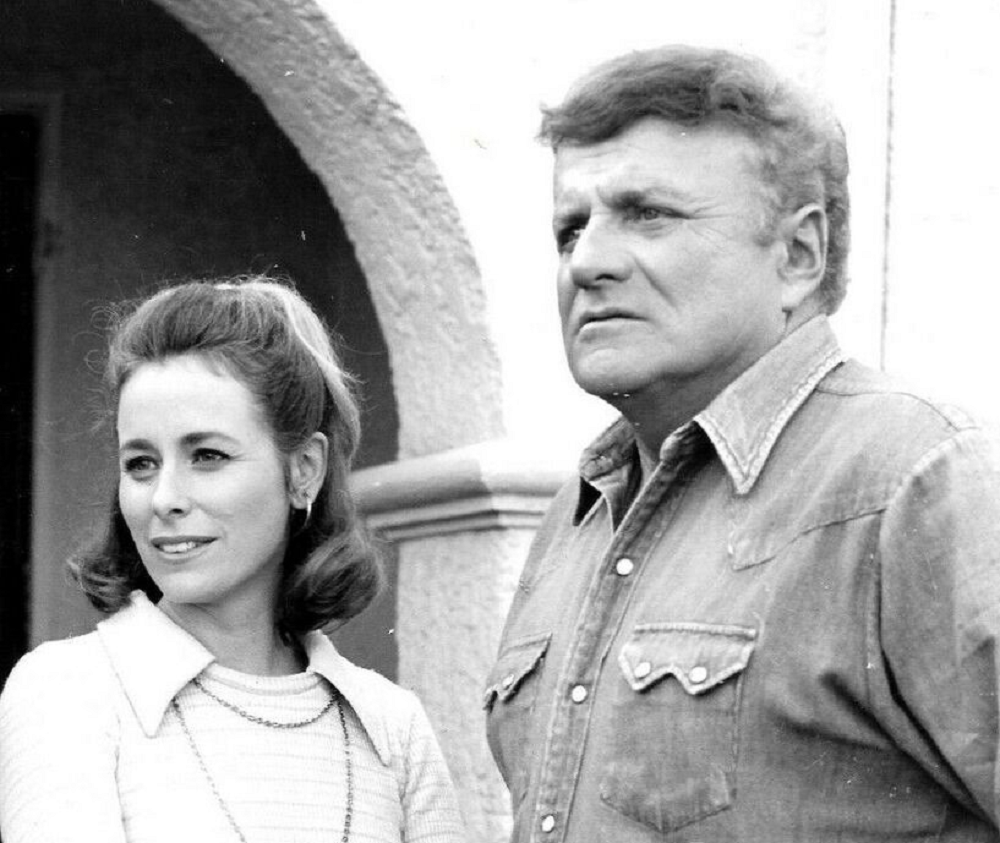
The Underground Man was a 1974 TV movie starring Peter Graves as Lew Archer, based on the 1971 novel of the same name. It did well enough that NBC took the pilot to series as a mid-season replacement in January 1975, although by this point Graves had opted out of the project. He was replaced by Brian Keith, fresh off cancelled sitcom The Brian Keith Show, who brought very little to the role, the dictionary definition of going through the motions and in stark contrast to Newman’s charismatic turn.
Archer made its debut on January 20th 1975, replacing the departing Ironside, and actually did better in the ratings than its predecessor, which was at the end of an eight-season run. That doesn’t mean that ratings were in any way decent, however, and the decision was to cancel the show after just two episodes had aired, the six completed episodes finishing their run on March 13th, when Archer was replaced by The Mac Davis Show, a country-tinged variety show. Archer has never been re-run and little remains of the show save for its title sequence and theme music from Jerry Goldsmith, which was released on vinyl by La-La Land Records in 2019.
Next on The Telephemera Years: More of 1974’s flop debuts, including a whole planet of apes!
Check out our other Telephemera articles:
The Telephemera Years: pre-1965 (part 1, 2, 3, 4)
The Telephemera Years: 1966 (part 1, 2, 3, 4)
The Telephemera Years: 1967 (part 1, 2, 3, 4)
The Telephemera Years: 1968 (part 1, 2, 3, 4)
The Telephemera Years: 1969 (part 1, 2, 3, 4)
The Telephemera Years: 1971 (part 1, 2, 3, 4)
The Telephemera Years: 1973 (part 1, 2, 3, 4)
The Telephemera Years: 1975 (part 1, 2, 3, 4)
The Telephemera Years: 1977 (part 1, 2, 3, 4)
The Telephemera Years: 1978 (part 1, 2, 3, 4)
The Telephemera Years: 1980 (part 1, 2, 3, 4)
The Telephemera Years: 1982 (part 1, 2, 3, 4)
The Telephemera Years: 1983 (part 1, 2, 3, 4)
The Telephemera Years: 1984 (part 1, 2, 3, 4)
The Telephemera Years: 1986 (part 1, 2, 3, 4)
The Telephemera Years: 1987 (part 1, 2, 3, 4)
The Telephemera Years: 1989 (part 1, 2, 3, 4)
The Telephemera Years: 1990 (part 1, 2, 3, 4)
The Telephemera Years: 1992 (part 1, 2, 3, 4)
The Telephemera Years: 1995 (part 1, 2, 3, 4)
The Telephemera Years: 1997 (part 1, 2, 3, 4)
The Telephemera Years: 1998 (part 1, 2, 3, 4)
The Telephemera Years: 2000 (part 1, 2, 3, 4)
The Telephemera Years: 2003 (part 1, 2, 3, 4)
The Telephemera Years: 2005 (part 1, 2, 3, 4)
The Telephemera Years: 2006 (part 1, 2, 3, 4)
The Telephemera Years: 2008 (part 1, 2, 3, 4)
Titans of Telephemera: Irwin Allen
Titans of Telephemera: Stephen J Cannell (part 1, 2, 3, 4)
Titans of Telephemera: DIC (part 1, 2)
Titans of Telephemera: Hanna-Barbera (part 1, 2, 3, 4, 5)
Titans of Telephemera: Kenneth Johnson
Titans of Telephemera: Sid & Marty Krofft
Titans of Telephemera: Glen A Larson (part 1, 2, 3, 4)
Titans of Telephemera: Quinn Martin (part 1, 2)
Titans of Telephemera: Ruby-Spears

